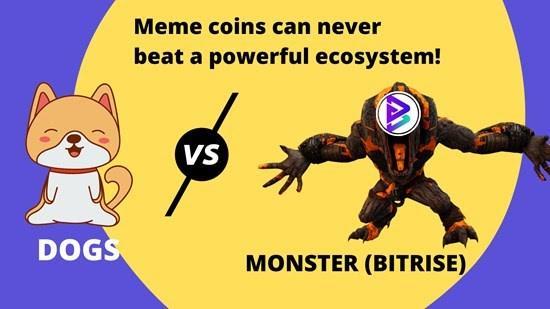Fintech PR
Dogelon Community Joins Bitrise Coin

New York, New York–(Newsfile Corp. – November 13, 2021) – Dogelon community joins Bitrise coin. Dogelon Mars is a micro-cryptocurrency built on the Ethereum blockchain. It is a cryptocurrency project working to become the first interplanetary currency. The native coin for the Dogelon platform is Elon and was launched on 23rd April 2021. The nature of the Dogelon crypto coin will be the most discussed topic. This is because Dogelon does not fall in the meme crypto category since the team says it will be an evolving project.
To view an enhanced version of this graphic, please visit:
https://orders.newsfilecorp.com/files/8372/103428_5cb480b6f4d2aafa_001full.jpg
Like other crypto coins, the Dogelon community will be looking forward to good returns. This means Dogelon has to compete with other crypto projects. In the recent past, Dogelon has been compared with emerging crypto coins that will be tough competitors. One of the coins competing with Dogelon is Bitrise, a new coin that is mooning and exciting the crypto community. Bitrise coins launched on 28th July 2021, two months after Dogelon.
Bitrise coin is a DeFi protocol running on Binance Smart Chain, while Dogelon has not been defined as Defi. The team behind Bitrise project is developing a disruptive decentralised financial system. Dogelon so far has not developed a payment system.
Unlike Dogelon, Bitrise platform will be making a real impact on society. The Bitrise has laid out a roadmap on how this will be achieved. Dogelon still has no whitepaper on its page. There is also no roadmap on the Dogelon main website.
According to the Bitrise team, the coin has been receiving thousands of new members from other crypto communities, and Dogelon is one of them. Bitrise is developing the biggest DeFi protocol, which is appealing to the Dogelon community.
Both Bitrise and Dogelon tokenomics are different. Bitrise burned 50% of quadrillion tokens in supply upon launching, just like Dogelon.The remaining 50% of Dogelon tokens is permanently locked in the Uniswap liquidity pool. Unlike Dogelon, the remaining 50% of Bitrise tokens, only 38% goes to the liquidity pool, unlike 50% of Dogelon quadrillion tokens. Therefore, Bitrise tokens will create higher demand than Dogelon because of the smaller number in the pool.
Bitrise is a hyper-deflationary token, a factor that is appealing to the Dogelon community. Bitrise will have tokens in the pool bought back and burned automatically using a buyback contract, while Dogelon is yet to provide buyback and burning details.
Bitrise investors are rewarded for holding the token, which is not happening at Dogelon. For holding Bitrise tokens, users will get a share of the tax charged on every token sold in BNBs. This is not happening at Dogelon. The Dogelon website has no info on token-holding rewards.
The Bitrise team announced the start of the staking process before the Dogelon team. According to the Bitrise team, after the staking announcement, there was a rise in Dogelon community members joining Bitrise. Dogelon still hasn’t developed its staking program for Dogelon token holders.
Utilities
Bitrise will soon launch more utilities, including community members’ passive income from staking. The team says it is expecting more Dogelon members to join before the launch of the staking program.
Bitrise has done a lot in developing its DeFi protocol and is now attracting the Dogelon community. Therefore, there might be more Dogelon community members joining Bitrise.
Media Contact
John K
Email: [email protected]
Website: https://www.bitrisetoken.com
Telegram: https://t.me/bitrisetoken
To view the source version of this press release, please visit https://www.newsfilecorp.com/release/103428
Powered by WPeMatico
Fintech PR
President Emmerson Mnangagwa met this week with Zambia’s former Vice President and Special Envoy Enoch Kavindele to discuss SADC’s candidate for the AfDB
President Mnangagwa, who is SADC Chairperson, reaffirmed his own country’s and SADC’s enthusiastic support for Zambian candidate Sam Maimbo
LUSAKA, Zambia, Dec. 20, 2024 /PRNewswire/ — Special Envoy Kavindele released the following statement following the meeting:
“I am elated to witness the growing success and momentum of Sam Maimbo’s candidacy to become the next President of the African Development Bank. I am filled with gratitude to our friends across both SADC and COMESA for their continued support and good wishes.
Sam has garnered such wide consensus due to his being uniquely qualified to deliver the transformative change and empowerment our continent needs. Sam’s 30 years in development work is defined by driving outcomes, improving processes, and investing in people. The AfDB needs a hands-on leader who is laser focused on delivering results and who is unafraid of making tough decisions in order to best serve our continent. Sam is that leader. Sam has the track record and experience to drastically enhance the pace, scale, and impact of the Bank’s work in service of the people and governments of Africa.
Our region has a proud history of supporting fellow Southern Africans. For example, we all recall Lusaka’s role in hosting the African National Congress’ headquarters during the dark days of Apartheid oppression.
It therefore gives me no pleasure to observe my South African brothers, who have themselves leant on Zambia’s steadfast friendship over many decades, fail to rally behind both SADC and COMESA’s chosen candidate for the AfDB. Africa’s urgent economic development challenges demand transformational leadership at the AfDB, it is all of our responsibility to put forward the best candidate for the job. This is not the time or place for a government to act with narrow self-interest, we all must act in the continent’s and AfDB’s best interest.
I thank Sam Maimbo for his lifelong service to our entire continent, and I am eager to witness his enormous impact as President of the AfDB.”

Fintech PR
Stay Cyber Safe This Holiday Season: Heimdal’s Checklist for Business Security
LONDON, Dec. 20, 2024 /PRNewswire/ — Heimdal Security shares a practical holiday cybersecurity checklist, offering expert insights to help businesses safeguard against cyber threats this festive season.
With reduced staffing, remote work setups, and a surge in online shopping creating heightened vulnerabilities, this guide offers actionable tips to enhance business security.
Going beyond basic advice, the checklist also highlights the most common holiday scams and features videos showcasing real-life examples of Christmas-themed cyber scams and effective prevention strategies.
Key Tips to Protect Businesses This Holiday Season:
- Strengthen endpoints: Ensure devices are updated with antivirus and endpoint protection software; consider Endpoint Detection and Response (EDR) and application whitelisting.
- Prepare for phishing spikes: Train staff to identify suspicious emails, enforce robust email filters, and establish protocols for reporting unusual activity.
- Secure remote access: Mandate VPN usage, monitor unusual logins, and deactivate inactive accounts temporarily.
- Segment and shield networks: Isolate sensitive areas, deploy DNS security and advanced firewalls, and maintain full visibility over network traffic.
- Apply timely patches: Regularly update all systems and test patches in a controlled environment to minimize disruptions.
- Mitigate supply chain risks: Assess vendors thoroughly and limit their access to essential systems.
- Have a response plan ready: Tailor incident protocols for the holidays, create an on-call rotation for the IT team, and enable rapid action against suspicious activity.
“ Cybercriminals thrive on holiday distractions, but with proactive measures like phishing training, secure endpoints, and network segmentation, businesses can stay ahead of potential threats,” said Alex Panait, System Administrator at Heimdal Security.
Common Holiday Scams That Businesses Should Watch For:
Cybercriminals often tailor their tactics to exploit the festive season. The most common scams include:
- Spear phishing: Emails disguised as holiday bonuses or event invitations that steal credentials or spread malware.
- Malicious holiday E-Cards: Festive greetings that contain links deploying ransomware or spyware.
- Fake E-Commerce sites: Fraudulent websites offering discounts to steal payment information.
- Insider threats: Distracted or disgruntled employees mishandling or exploiting sensitive data.
- Corporate travel scams: Fake booking platforms targeting business travelers.
- Business email compromise (BEC): Fraudulent requests for urgent wire transfers during year-end financial rushes.
For more, read the full article here or watch the video on YouTube to see how these threats unfold and learn actionable prevention strategies.
About Heimdal:
Established in Copenhagen in 2014, Heimdal® empowers CISOs, security teams, and IT administrators to improve their security operations, reduce alert fatigue, and implement proactive measures through a unified command and control platform.
Heimdal’s award-winning cybersecurity solutions span the entire IT estate, addressing challenges from endpoint to network levels, including vulnerability management, privileged access, Zero Trust implementation, and ransomware prevention.
For further press information:
Madalina Popovici
Media Relations Manager
[email protected]
View original content:https://www.prnewswire.co.uk/news-releases/stay-cyber-safe-this-holiday-season-heimdals-checklist-for-business-security-302337465.html

Fintech PR
According to Tickmill survey, 3 in 10 Britons in economic difficulty: Purchasing power down 41% since 2004
The people who have the most problems are women (30%) and are between 35 and 49 years old (39%)
ROME, Dec. 20, 2024 /PRNewswire/ — The purchasing power in the UK has dropped by 41% over the last 20 years. Today, £100,000 left in a bank account since 2004 without being invested would now be worth £59,021.
This figure is one of the findings from a study conducted by Tickmill, an international online trading broker that compared the economic situation in the UK and the European Union through the infographic “Purchasing Power and Cost of Living: UK vs EU”.
The analysis reveals a slight decline of 0.4% in the UK’s purchasing power, which currently stands at £41,573. In contrast, the European Union has seen a modest rise of 0.1%, reaching £40,874.
Why is purchasing power declining in the UK? One key factor is the cost of living. If the UK were still part of the European Union, it would rank as the fifth most expensive country, behind Ireland, Luxembourg, Denmark, and the Netherlands.
Unsurprisingly, 3 in 10 Britons are struggling with the cost of living. Women (3 in 10, compared to 25% of men), those aged between 35 and 49 (4 in 10), households earning less than £15,000 (6 in 10), and single parents (1 in 2) are among the most affected groups.
Among UK nations, Northern Ireland is the hardest hit, with 34% of its population facing financial difficulties, followed by Wales (31%), England (28%), and Scotland (22%). In England, the North East has the highest percentage of people struggling, with 4 in 10 residents affected. Even in London, the high costs impact 1 in 4 adults.
In response to these challenges, Britons are making significant adjustments:
- 53% have cut back or delayed spending on smaller items like eating out, entertainment, subscriptions, clothing, toys, books, etc.;
- 52% have reduced household energy consumption;
- 48% have decreased their grocery spending;
- 41% have scaled back or postponed major expenditures, such as holidays, cars, and weddings;
- 26% are working longer hours, taking on overtime, or pursuing additional jobs to earn extra income.
The British also made changes on the financial side. One in four adults has been forced to dip into their savings or investments to cover daily expenses. Moreover, 44% have stopped saving or investing entirely or have reduced their savings and investments—a 4% increase compared to 2023.
The lack of investment is another critical factor contributing to the decline in purchasing power. It is estimated that 13 million UK residents hold £430 billion in cash deposits but do not invest. The reasons? Seventy-four percent say they cannot compare investment products effectively, and 43% are afraid of losing their money.
A lack of knowledge and fear are preventing many savers from taking advantage of an important opportunity: preserving or increasing their purchasing power in the long term.
Photo: https://mma.prnewswire.com/media/2586123/Tickmill.jpg
Logo: https://mma.prnewswire.com/media/2586129/Tickmill_Logo.jpg
![]() View original content to download multimedia:https://www.prnewswire.co.uk/news-releases/according-to-tickmill-survey-3-in-10-britons-in-economic-difficulty-purchasing-power-down-41-since-2004-302337354.html
View original content to download multimedia:https://www.prnewswire.co.uk/news-releases/according-to-tickmill-survey-3-in-10-britons-in-economic-difficulty-purchasing-power-down-41-since-2004-302337354.html

-

 Fintech5 days ago
Fintech5 days agoFintech Pulse: Your Daily Industry Brief (Synapse, Shenzhen Institute, Visa, AutomatIQ, MeridianLink)
-

 Fintech5 days ago
Fintech5 days agoFintech Pulse: Your Daily Industry Brief (Revolut, Bestow, Advyzon, Tyme Group, Nubank)
-

 Fintech2 days ago
Fintech2 days agoFintech Pulse: Your Daily Industry Brief (Chime, ZBD, MiCA)
-

 Fintech5 days ago
Fintech5 days agoAsian Financial Forum returns as region’s first major international financial assembly in 2025
-

 Fintech6 days ago
Fintech6 days agoNASDAQ-Listed LYTUS Appoints Visionary Leader Sai Guna Ranjan Puranam as COO (Lytus Healthcare) and Group CTO (Lytus Technologies) to Revolutionize Healthcare and Technology
-

 Fintech PR2 days ago
Fintech PR2 days agoAccording to Tickmill survey, 3 in 10 Britons in economic difficulty: Purchasing power down 41% since 2004
-

 Fintech6 days ago
Fintech6 days agoDhaka Court Dismisses Allegations Against Nagad Founder Tanvir A Mishuk
-

 Fintech PR4 days ago
Fintech PR4 days agoGan & Lee Pharmaceuticals Announces U.S. FDA Clearance of the IND application for the innovative Bi-weekly GLP-1RA GZR18 Injection, Bofanglutide, with chronic weight management Indication (A Phase 2 head-to-head with Tirzepatide clinical trial)

















